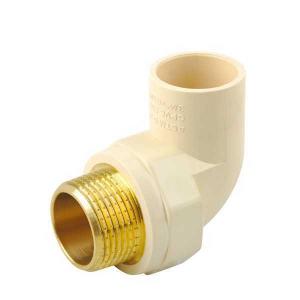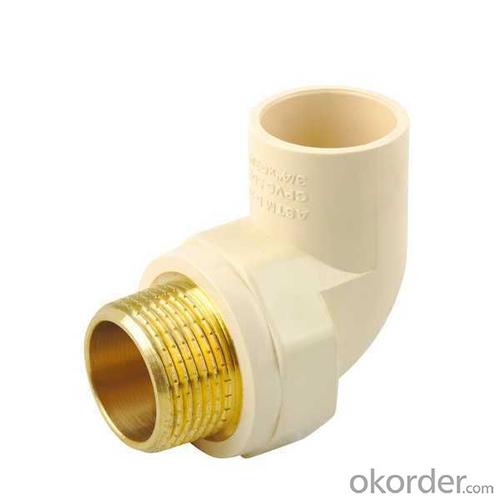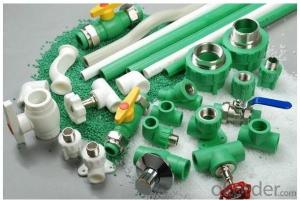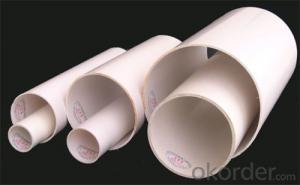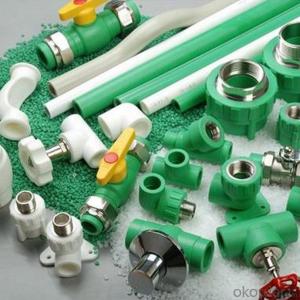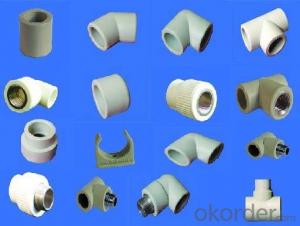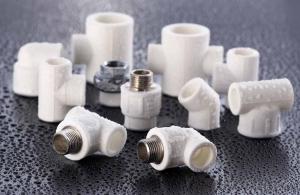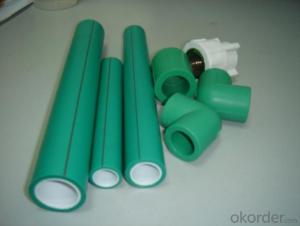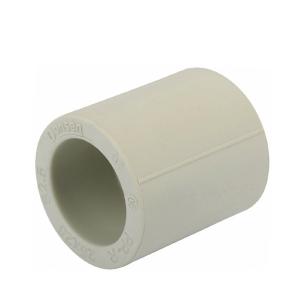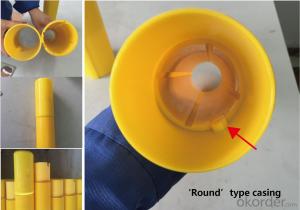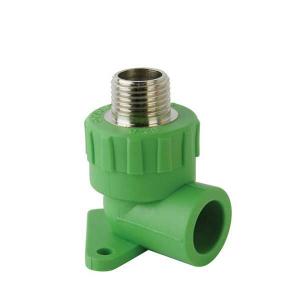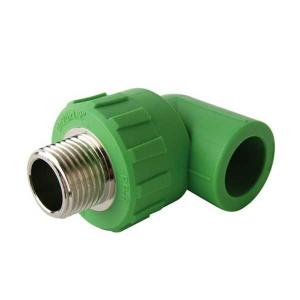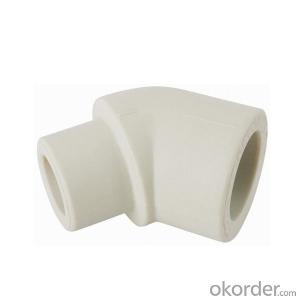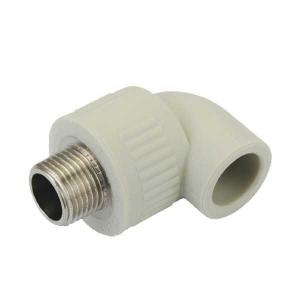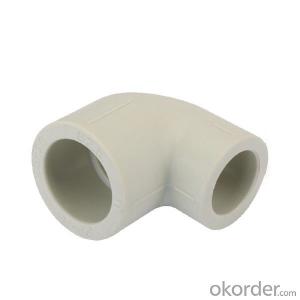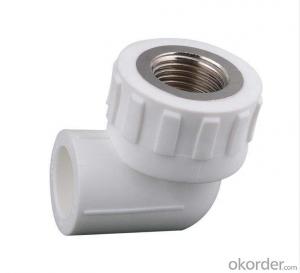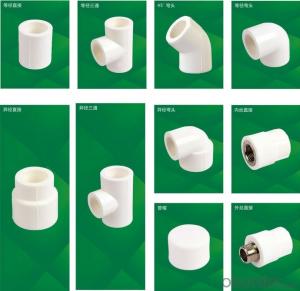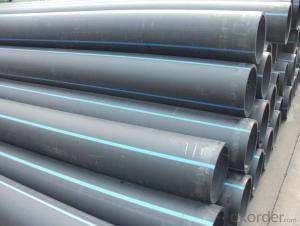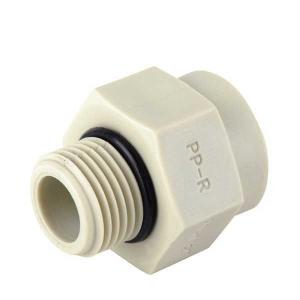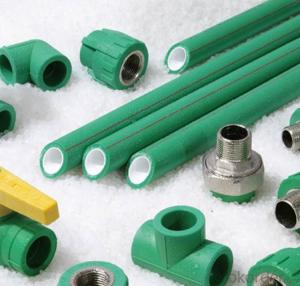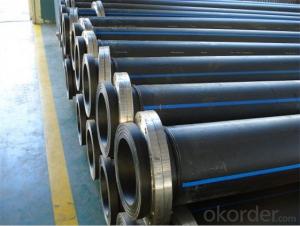Small Bore Plastic Pipe Fittings High Quality Male Elbow
- Loading Port:
- Ningbo
- Payment Terms:
- TT or LC
- Min Order Qty:
- 1000 watt
- Supply Capability:
- 100000 watt/month
OKorder Service Pledge
Quality Product, Order Online Tracking, Timely Delivery
OKorder Financial Service
Credit Rating, Credit Services, Credit Purchasing
You Might Also Like
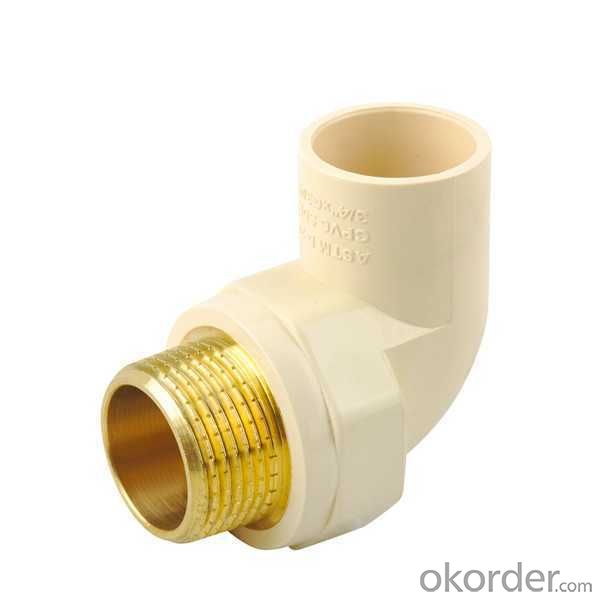 cpvc plastic fittings raw materials from KANEKA japan laser marking high rigidity easy installation corrosion-resistant PN25 ASTM2846 standard size:1/2*1/2''--1*1/2''
cpvc plastic fittings raw materials from KANEKA japan laser marking high rigidity easy installation corrosion-resistant PN25 ASTM2846 standard size:1/2*1/2''--1*1/2''
1.Material:Random Polypropylene(Hyosung R200P);
2.ISO9001&ISO14001;
3.Standard:GB/T 18742.3-2002, DIN8077/8078;
4.OEM also ok
- Q: Can plastic pipe fittings be used for hydrogen gas storage?
- No, plastic pipe fittings cannot be used for hydrogen gas storage. Hydrogen gas is highly reactive and can cause degradation and embrittlement of plastic materials, leading to potential leaks and safety hazards. It is recommended to use materials like metal alloys or composite materials specifically designed for hydrogen gas storage.
- Q: Can plastic pipe fittings be used for portable water systems?
- Yes, plastic pipe fittings can be used for portable water systems. They are commonly used in residential and commercial applications due to their durability, affordability, and resistance to corrosion. However, it is important to ensure that the specific plastic material used is approved for potable water applications and meets the necessary standards and regulations.
- Q: Are plastic pipe fittings suitable for pneumatic conveying systems?
- Yes, plastic pipe fittings are suitable for pneumatic conveying systems. They offer several advantages such as corrosion resistance, lightweight construction, ease of installation, and flexibility. Additionally, plastic fittings can handle the high pressures and abrasive materials commonly found in pneumatic conveying systems.
- Q: Can plastic pipe fittings be used for pressure washing systems?
- Yes, plastic pipe fittings can be used for pressure washing systems. Plastic fittings are commonly used in these systems due to their durability, resistance to corrosion, and affordability. However, it is important to ensure that the fittings are rated for the pressure and temperature requirements of the specific pressure washing system.
- Q: How to calculate joint parts for hot melt connection of water supply plastic pipe?
- Calculate the joint, you have to draw a sketch, and then point out how many joints.
- Q: Are plastic pipe fittings resistant to freezing temperatures?
- Yes, plastic pipe fittings are generally resistant to freezing temperatures.
- Q: Can plastic pipe fittings be used for gas supply?
- Yes, plastic pipe fittings can be used for gas supply, but it is important to ensure that the fittings are specifically designed and approved for use with gas.
- Q: Can plastic pipe fittings be used for swimming pool filtration?
- Yes, plastic pipe fittings can be used for swimming pool filtration. Plastic pipe fittings are commonly used in swimming pool filtration systems due to their durability, resistance to corrosion, and affordability. They are capable of handling the water flow and pressure required for efficient filtration, making them a suitable choice for this purpose.
- Q: Do plastic pipe fittings meet building code requirements?
- Yes, plastic pipe fittings can meet building code requirements. However, it is important to check with local building codes and regulations as they may vary depending on the specific location and type of construction project.
- Q: How do plastic pipe fittings compare to polybutylene fittings?
- Plastic pipe fittings and polybutylene fittings are both commonly used in plumbing systems, but they have some differences. Plastic pipe fittings are typically made from PVC (polyvinyl chloride) or CPVC (chlorinated polyvinyl chloride), while polybutylene fittings are made from a type of plastic called polybutylene resin. In terms of durability, plastic pipe fittings are generally more resistant to chemicals, heat, and pressure compared to polybutylene fittings. Plastic fittings also tend to be less prone to corrosion, making them a more reliable option for long-term use. Polybutylene fittings, on the other hand, were widely used in residential plumbing systems in the past but have since fallen out of favor due to concerns about their long-term reliability. Polybutylene has been associated with issues such as brittle pipes, leaks, and ruptures, particularly when exposed to chlorine or other chemicals commonly found in water supplies. Overall, plastic pipe fittings are considered a safer and more durable choice for plumbing systems compared to polybutylene fittings. It's important to consult with a professional plumber or adhere to local building codes when selecting fittings to ensure the best choice for your specific plumbing needs.
Send your message to us
Small Bore Plastic Pipe Fittings High Quality Male Elbow
- Loading Port:
- Ningbo
- Payment Terms:
- TT or LC
- Min Order Qty:
- 1000 watt
- Supply Capability:
- 100000 watt/month
OKorder Service Pledge
Quality Product, Order Online Tracking, Timely Delivery
OKorder Financial Service
Credit Rating, Credit Services, Credit Purchasing
Similar products
Hot products
Hot Searches
Related keywords
